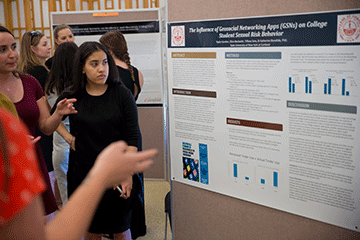
04/20/2021
Transformations 2021, SUNY Cortland’s annual showcase of research and other scholarly activity, edges toward normalcy as the conference will be presented as virtual poster sessions, individual seminars and faculty-coordinated student sessions on Friday, April 30.
Abstracts of those presentations will be posted online as the Transformation Committee for a second year avoids in-person gatherings during the continuing COVID-19 pandemic.
“The April 30 conference is virtual, but there will be real-time presentations by students,” said R. Bruce Mattingly, dean of the School of Arts and Sciences and Transformations Committee chair.
“Taking into consideration all those constraints that dealing with COVID-19 has caused with research for faculty and students alike, we thought 57 presentations was a phenomenal amount of scholarship,” said committee member Erin Morris, assistant professor of sport management.
In addition to attendance by members of the campus community, invitations are extended to area high schools, the university’s elected representatives and to the Cortland community at large.
Students and their faculty mentors plan 57 Webex presentations this year, including 39 live online talks and 18 live poster session presentations.
Meanwhile, the online Digital Commons, already home for an archival collection of Transformations programs, will once again be available for those students who opt to post more extensive conference materials online, especially posters and other visual materials. Posted material can be closed to viewers from outside the campus community on the discretion of the student or faculty member involved in the research. Digital Commons is an online repository intended to publicize and make available various collections created by SUNY Cortland faculty, staff and students.
The selected presenters were encouraged to choose from a menu that includes 5-minute “lightning talks” for those giving a poster session; 15-minute-long individual talks; and faculty-organized sessions of three or four sequential talks. Sessions may include presentations from different students enrolled in the same academic department or interdisciplinary sessions featuring presentations that have a thematic link.
Poster presenters will be asked to share their poster and give a brief explanation — up to five minutes — of their findings during one of that day’s Webex poster sessions, either 11:30 a.m. to 12:30 p.m., 1:50 to 2:50 p.m., or 3 to 4 p.m.
Students’ single, 15-minute talks via Webex will be scheduled for 10:20 to 11:20 a.m., 12:40 to 1:40 p.m. or 3 to 4 p.m. Students will be expected to share abstracts of their presentations.
The faculty-organized session schedule is intergrated into the 15-minute talks.
“We are trying our best to recreate a typical conference experience using Webex,” said Transformation Committee member Kaitlin Flannery, assistant professor of psychology.
“We devised ‘lightning talks’ to replace a typical poster presentation — essentially, students will display their poster on Webex and give a 5-minute explanation of their study,” rather than hanging around their actual poster and answering passersby questions informally, Flannery said.
“Audience members will then have the opportunity to ask questions and engage with the student presenters. A benefit of this format is that audience members will be able to hear from many different students across several departments and areas of study in a relatively short amount of time.”
The electronic “posters” as well as necessary visuals for other seminars will be shared on the university’s Digital Commons, to be accessed online and viewed during the talks.
This year, with the conference hosted through Webex, Digital Commons will serve as a complement and a supplement to the conference, allowing students to host and share their posters and presentations long-term, said Hilary Dorsch Wong, instructional services librarian in Memorial Library and a Transformations Committee member.
“Since the poster presentations this year will be given as ‘lightning talks,’ sharing posters through Digital Commons will allow people to see the posters at leisure and in greater detail before, during and after the talks,” said Wong, who once again has assisted in uploading conference digital images.
“Last year, when normal plans for the Transformations conference crashed to a halt, I was pleased that the library’s Digital Commons could become the means for the Transformations conference to happen, allowing students to share their hard work and research,” Wong said.
“This year, it's exciting to have both a live virtual conference, and the long-term ability for students to share their work through Digital Commons if they so desire.”
Last year’s Transformations was cancelled as a live event when the spread of the virus abruptly shut down in-person campus activities right after Spring Break. Last May 13, the Transformations Committee instead published all 170 of the lecture abstracts submitted by students on the Transformations web page with supporting materials on Digital Commons.
Transformations, and its emphasis on student research, was created in 2012 by changing the name and focus of SUNY Cortland’s traditional Scholars’ Day to Transformations: A Student Research and Creativity Conference. A highlight of the academic year, this event focuses on student research, which is defined as an original investigation or creative activity through the primary efforts of a student or group of students.
Support for Transformations has been provided by the President’s Office and the Provost and Vice President for Academic Affairs Office with a special thanks to the Student Alumni Association for providing volunteers. The Transformation Committee also includes Martine Barnaby, art and art history; Kevin Dames, kinesiology; Laura Eierman, biological sciences; Eunyoung Jung, foundations and social advocacy; Jill Murphy, health; Kimberly Rombach, childhood/early childhood education; and Meghan VanDeuson, art and sciences.
More information is contained in the College Archives Research Guide. For more information about Transformations, contact the Dean of Arts and Sciences’ Office at 607-753-4312 or at SchoolOf.ArtsandSciences@cortland.edu.